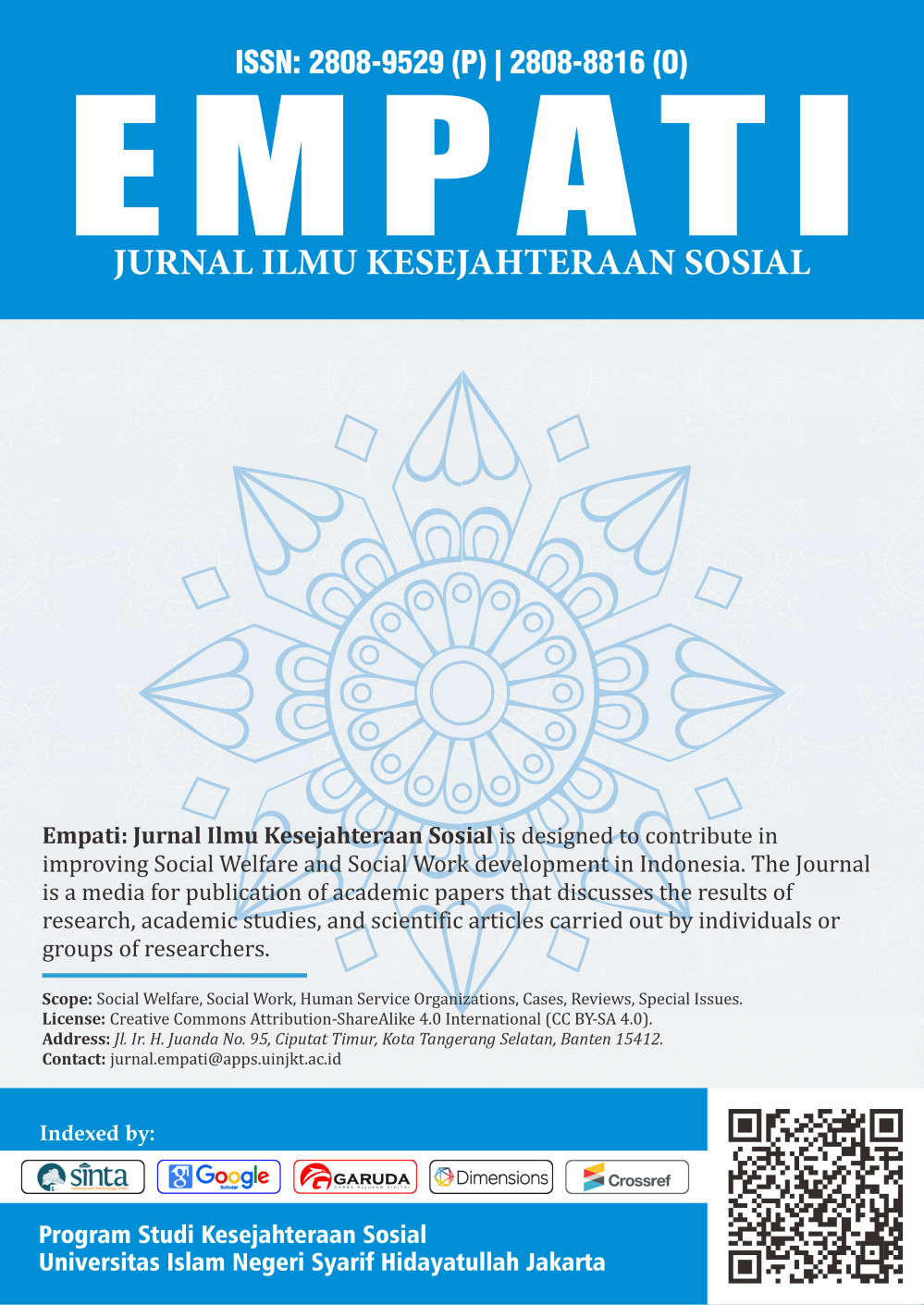PROGRAM PENDIDIKAN PENGEMBANGAN KEPEMIMPINAN SEBAGAI UPAYA PEMBERDAYAAN PADA PEMUDA
DOI:
https://doi.org/10.15408/empati.v9i2.18227Keywords:
Program, Social Development, Capacity Building, Youth Empowerment, Implementation, Learning Outcome, Pembangunan Sosial, Peningkatan Kapasitas, Pemberdayaan Pemuda, Implementasi,Abstract
Abstrak. This study attempts to see the implementation of leadership development education programs as an effort to empower youth as an effort to empower youth. The leadership development education program that was highlighted was a leadership development program implemented by the non-profit organization named Rumah Kepemimpinan. This study will discuss how the implementation of leadership development education programs is one of the steps to empower youth, especially in capacity building related to aspects of knowledge, skills and attitudes. This study is taken with a qualitative approach that will involve a number of informants from internal organizations and beneficiaries. From the results obtained, the beneficiaries felt significant results, especially in the aspect of capacity building in the aspects of knowledge, skills and attitudes that were more optimal, targeted and measured.
Abstrak. Studi ini mencoba untuk melihat pelaksanaan program pendidikan pengembangan kepemimpinan sebagai upaya pemberdayaan pemuda sebagai salah satu upaya dalam pemberdayaan pemuda. Program pendidikan pengembangan kepemimpinan yang disoroti adalah program pengembangan kepemimpinan yang dilaksanakan oleh organisasi non-profit Rumah Kepemimpinan. Studi ini akan membahas bagaimana pelaksanaan program pendidikan pengembangan kepemimpinan menjadi salah satu langkah pemberdayaan pemuda terutama pada peningkatan kapasitas yang berhubungan dengan aspek pengetahuan, keterampilan dan juga sikap. Studi ini diambil dengan pendekatan kualitatif yang akan melibatkan sejumlah informan dari internal organisasi dan peserta program. Dari hasil yang didapat, peserta program merasakan hasil yang signifikan terutama dalam aspek peningkatan kapasitas pada aspek pengetahuan, keterampilan, dan sikap yang lebih optimal, terarah dan terukur.
Downloads
References
Adi, I. R. (2012). Intervensi Komunitas dan Pengembangan Masyarakat. PT. Raja Grafindo Persada.
Ahmad, F., & Rahayu, E. (2019). The Role of Students as Agent of Change in Empowering Micro Enterprises. Asian Social Work Journal, 4(4), 9–18. https://doi.org/10.47405/aswj.v4i4.107
Anderson, A. A. (2004). The Aspen Institute Roundtable on Community Change. www.aspeninstitute.org
Bryman, A. (2016). Social Research Method: The nature and process of social research. Social Research Method, 3–16.
de Araujo, P., & Murray, J. (2010). Estimating The Effects of Dormitory Living on Student Performance. Economics Bulletin, 30(1), 866–878. https://doi.org/10.2139/ssrn.1555892
Djamba, Y. K., & Neuman, W. L. (2002). Social Research Methods: Qualitative and Quantitative Approaches. In Teaching Sociology (Vol. 30, Issue 3). https://doi.org/10.2307/3211488
Dumilah, A. R., & Rahayu, E. (2020). Program Pendidikan Kecakapan Hidup (Lifeskills) Sebagai Strategi Intervensi Dalam Perspektif Pembangunan Sosial di Indonesia. 5(2), 113–120.
Fleming, F. (2013). Evaluation methods for assessing Value for Money. October, 2–17.
Hall, B. L. (2006). Rethinking Leadership Education for The Real World. Phi Delta Kappan, 87(7), 524–525. https://doi.org/10.1177/003172170608700716
Ife, J. (1995). Community Development, Creating Community Alternatives – Vision, Analysis and Practice. Longman.
Kendall, J., & Knapp, M. (2000). The third sector and welfare state modernisation : Inputs , activities and comparative performance. Civil Society Working Paper 14, December, 1–18. http://eprints.lse.ac.uk/29055/
Kepemimpinan, R. (2018). Pedoman Sistem Manajemen Pembinaan Rumah Kepemimpinan. RK Press.
Krefting, L. (1991). Rigor in Qualitative Research: The Assessment of Trustworthiness. American Journal of Occupational Therapy, 45(3), 214–222.
McCauley, C. (2008). Leader Development: A Review of Research. Center for Creative Leadership, September, 1–86. http://www.breakoutofthebox.com/LeaderDevelopmentReviewOfResearch.pdf
Midgley, J. (1995). Social Development: the Developmental Perspective in Social Welfare. SAGE Publications Ltd.
Payne, M. (2005). Modern Social Work Theory (3rd ed.). Pearson Education, Ltd.
Rost, J. C., & Barker, R. A. (2000). Leadership Education in Colleges: Toward a 21st Century Paradigm. Journal of Leadership Studies, 7(1), 3–12. https://doi.org/10.1177/107179190000700102
Ryan, F., Coughlan, M., & Cronin, P. (2009). Interviewing in qualitative research: The one-to-one interview. International Journal of Therapy and Rehabilitation, 16(6), 309–314. https://doi.org/10.12968/ijtr.2009.16.6.42433
Serrat, O. (2017). Knowledge Solutions: Tools, Methods, and Approaches to Drive Organizational Performance. Knowledge Solutions: Tools, Methods, and Approaches to Drive Organizational Performance, 1–1140. https://doi.org/10.1007/978-981-10-0983-9
Sharpe, G., & Bay, N. (2011). A Review of Program Theory and Theory-Based Evaluations. American International Journal of Contemporary Research, 1(3), 1998–2001.
Solikhah, I. (2015). KKNI Dalam Kurikulum Berbasis Learning Outcomes. LINGUA: Journal of Language, Literature and Teaching, 12(1), 1–22. https://doi.org/10.30957/lingua.v12i1.68












